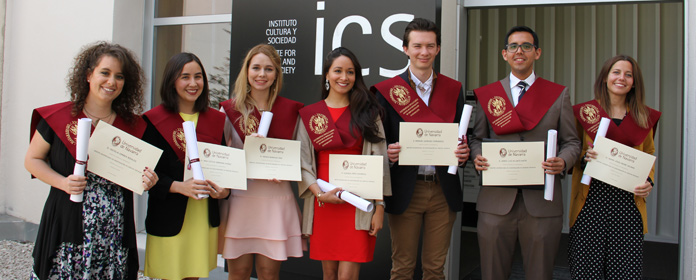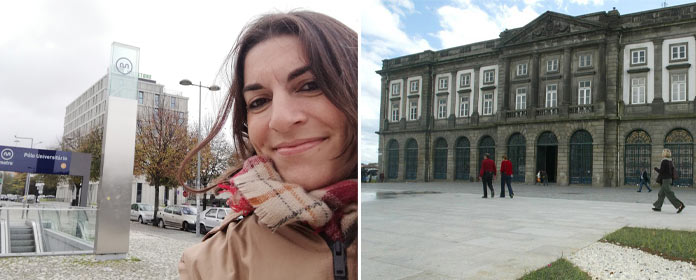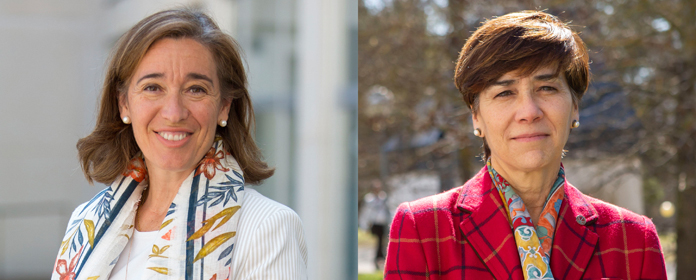The III graduating class of Master's Degree at research in Social Sciences celebrates its graduation.
Seven students from three different countries and seven different universities have studied MICS during the 2018/2019 academic year.

PHOTO: Natalia Rouzaut
graduate Seven students from Ecuador, Mexico and Spain have joined the third graduating class of Master's Degree at research in Social Sciences (MICS) of the University of Navarra. The graduating class is made up of María Barraza, Natalia Correa, María Jesús Freire, Manuel Gancedo, Claudia López Madrigal, Ana Cecilia Serrano and Jorge Luis Villacís.
The ceremony of submission was presided over by the director of the program, Ana Marta González, scientific coordinator of the ICS; deputy director and ICS researcher Inés Olza; and María Arantzamendi, godmother and ICS researcher. Institute for Culture and Society (ICS); the deputy director and ICS researcher Inés Olza; and María Arantzamendi, godmother of the graduating class and also an ICS researcher.
Of the seven students, three have studied the MICS thanks to a scholarship from the Social Trends Institute (STI); one through the Incentive Scholarships offered by the University of Navarra and Banco Santander; and another one with a scholarship from the STI and the essay Competition in Social Sciences organized by the ICS.
Mentality multidisciplinary to look at societyIn her speech, Inés Olza reviewed some data of the academic report of the course. She pointed out that the graduates came from three countries, seven different universities and very diverse backgrounds: Psychology, Journalism, Social Communication and Journalism, Humanities and programs of study Social or Political Sciences.
In his speech, the class delegate, Jorge Luis Villacís, thanked on behalf of his classmates the financial aid received throughout the course from professors, board management, family and friends. He also recalled the lessons learned at MICS: "To look at society and its problems with a reflective attitude and seek solutions through dialogue and work together with researchers from various disciplines".
For her part, Ana Marta González stressed the importance of Master's Degree for the "training for the research in social sciences by developing an interdisciplinary mentality", which is useful both for the doctorate and for the professional world. She also emphasized that the III promotion has been the most integrated course in the ICS since, not only two of its students collaborated with one of the projects of research, but also the TFM were aligned with the topics of research of the center.
González also reviewed the graduates' Final Projects Master's Degree , which are closely related to Education, young people and the family. Thus, students have been able to research on topics such as Education in values, reconciliation policies, the impact of technology on young people or consumer behaviors of sustainable fashion.
Likewise, the sponsor of the graduating class highlighted the multicultural contribution and multidisciplinary of Master's Degree. As she explained, both students and professors have learned to adapt to different ways of thinking and presenting work, from the practicality of an engineer to the dissertation of a philosopher.
Migration and the American dreamDuring the closing ceremony Inés Olza presented the award of the Contest of essay in Social Sciences 19 to Dania Andrade Urbina, 4th year student of Psychology at the University of Navarra, for her work 'A dream without sleep'.
In her essay, the student has revealed the reality of many Latin Americans who migrate to the U.S. illegally. She has indicated that massive migrations from Latin America to the U.S. have occurred continuously over time and the journey is full of hardships until they reach their destination. Likewise, when they finally reach their destination, they continue to have problems because "they are not well received and do not have decent jobs due to lack of documentation", he pointed out.
Thanks to award, Dania will study MICS during the 2019-2020 academic year, at pathway of Education and Psychology. Her goal is to be trained to develop programs that contribute to solve social problems in Latin American countries like hers, Guatemala.
Variety of fields and itinerariesThe MICS is coordinated by the ICS and has the direct partnership of the School of Communication, the School of Education and Psychology and the School of Philosophy and Letters. It is accredited as an official Master's Degree by the National Agency for Assessment of Quality and Accreditation.
It offers a gateway to entrance for students who wish to get started in the interdisciplinary research in Social Sciences. Its training program allows students to specialize in Communication, Sociolinguistics, Education and Psychology, Geodemography and Social and Cultural History. There is also the possibility of pursuing a double pathway.




